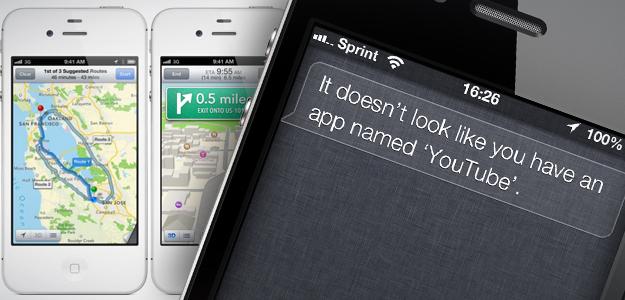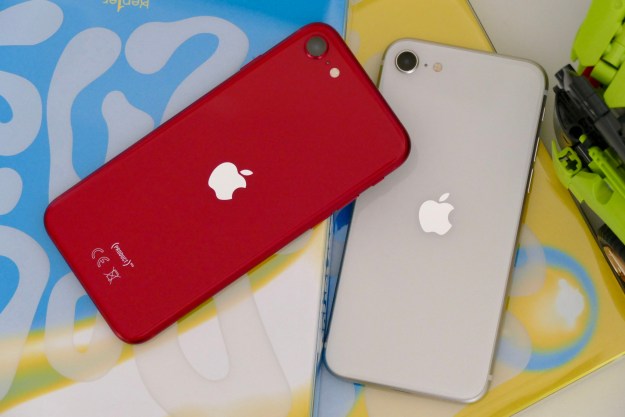
Apple recently made it clear that starting with iOS 6, it’s all Apple, all the time. Native apps like YouTube and Google Maps are getting the heave-ho, and for all the market sense this might make, there’s been some resistance on the user end. Writers Jeffrey Van Camp and Molly McHugh debate the merits of the coming change, whether it means anything for consumers and to what degree it will actually impact their iPhone experience.

Jeff |

Google has been giving Apple the short end of the stick on mapping for a while. Its Android phones have been bundled with a version of Google maps with turn-by-turn navigation and other cool features while the iPhone has lingered. I’m not sure if Apple didn’t want to pay extra or if Google didn’t want to give up the advantage of turn-by-turn, but I’d count the new mapping app as a win for Apple users. Now your device won’t be dependent on the whims of Google, which aims to outsell iPhone and iPad. Apple can now turn mapping into an experience consistent with the rest of iOS and integrate it deeply into whatever services it wishes.
And anyone who wants Google services can still get them. They’re going to be in the App Store.
Molly |

I’m also not very impressed with Apple’s in-house iPhone apps. Siri is a joke, I don’t use my iPhone’s calendar or weather app, and I pushed Safari to the backburner a long time ago.
On the other hand, I live in Google Maps and YouTube, and Chrome replaced Safari on my dashboard as soon as it became available. I understand that these will be available in the App Store, but I’m of the belief that you shouldn’t fix what isn’t broke, and if there’s one thing that has consistently been my saving smartphone grace it’s Google Maps. Having time and resources on its side gives it a huge head start over whatever Apple is bringing to the table, I don’t care how shiny and new it is.
There are also rumors Apple will switch to Bing search results in Safari, too. It feels like a crusade pointedly focused on ridding the phone of Google, no matter the cost, even though its an ecosystem that, from a software standpoint, users are familiar and comfortable using. And I don’t like it.
Jeff |
It sounds like you may want to buy an Android phone then. Apple pushes its own software and services heavier than any other company, even restricting other apps in its Store from offering some services because they compete. If you love your Google services, you should probably get a Google phone. Either that or you kind of need to deal with the slight inconvenience of having to download Google Maps from the App Store. Give me your phone after the update and I’ll do it for you. It’s not hard.
Apple’s new Maps app will have turn-by-turn navigation and other features. That is something Google Maps for iPhone does not have; making it a new feature you WILL have in the next couple months. That’s a good thing. If you don’t like it, you can still use whatever you want.
I’m not a huge fan of Apple’s anti-Google behavior, but it’s not like it doesn’t swing both ways. Google created Android to compete with the iPhone. If I were Apple and my good friend Google launched an operating system a lot like mine and was breathing down my neck, I’d start building my own maps team too.
Molly |
I don’t really think it’s fair to tell me that I have to get an Android… I’m the buyer, I want it all! A precedent was set when Apple first introduced us to the iPhone, and I don’t know why I have to settle for less.
Why can’t we have hybrid mobile experiences? Google shutting us out of nothing but Android, Apple doing this with iOS, Windows doing the same with its mobile OS, etc, etc, etc, it’s anti-consumer. If someone else has the better mobile application, then use it.
And I’m not saying that has to be a universal code of sorts, but these are some extenuating circumstances — Google Maps and YouTube inarguably dominate their respective markets, and they make way to much sense to get rid of. They make the iPhone a better experience, and I use them both on a daily basis. Part of what the iPhone was originally about, when it first launched, was putting all the things from the Internet we used on a daily basis into our pockets, and with these two major applications gone, that’s not the case. Besides iTunes (which is nearly universally agreed to be the worst), Apple hasn’t managed to create an application that draws a mass audience. So why get rid of the Google-made ones that do before Apple even has any hits on its hands?
Jeff |
I have two views on this. On one hand, it seems confusing and silly for Apple to bundle two separate mapping apps with its iPhone. They do the same thing. And if Apple is proud of its own new app, well… Apple does own the iPhone and iOS, so it has a right to promote its new product. Assuming it has a new video player to replace YouTube, it’s the same deal there as well. It isn’t blocking Google from the App Store (so far).
Molly |
Editors' Recommendations
- Best refurbished iPhone deals: Get an iPhone 14 for $513
- An Apple insider just revealed how iOS 18’s AI features will work
- 5 phones you should buy instead of the iPhone 15
- iPhone 16: news, rumored price, release date, and more
- Why you should buy the iPhone 15 Pro instead of the iPhone 15 Pro Max




